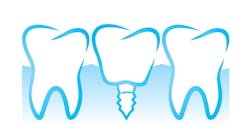Missing teeth are not just cosmetic issues. Dentists know this, but, surprisingly, many patients do not. As dental professionals, we must take time to illustrate to our patients how missing teeth not only affect overall dental health but also day-to-day life. For starters, edentulous patients can’t enjoy all of the foods they once loved. They have to change the way they chew and might even have to alter the way they talk. Without a tooth root for security, the jaw can shrink, weaken, and cause the cheeks and lips to sag.
According to the American College of Prosthodontists,1 the ratio of edentulous individuals in the geriatric population is 2 to 1. To break that down further, approximately 23 million individuals are completely edentulous, and 12 million are lacking teeth in one arch. The good news is that modern dentistry provides a solution—dental implants, which are the best option for replacing missing teeth.
If you have patients who are missing teeth, but you’re not sure if they would be good candidates for dental implants, consider the following criteria.
5 signs your patients might need dental implants
No. 1: They have missing or chipped teeth. Dental implants look natural and offer security to patients; no one will be able to spot the difference. Replacing missing teeth with dental implants is the most durable option that will allow patients to eat, talk, and live their lives just as they would if they had never lost or chipped their teeth.
If you encounter this problem, explain to your patients how missing teeth not only affect the ability to chew, talk, and drink but also put them at risk for recurring headaches and infection.
No. 2: Dentures aren’t fitting properly. When dentures don’t fit correctly, they can cause pain and discomfort. Dental implants are a better, more secure option compared to dentures because of their ability to function just like teeth. Implants can help patients who suffer from the pain of ill-fitting dentures by staying in place. This helps prevent further gum irritation and can greatly reduce discomfort.
If you have patients with ill-fitting dentures, discuss the pros and cons of switching them over to dental implants. Some of the pros include the longevity of implants, money patients will save over time, and fewer office visits needed.
No. 3: There is sign of infection. A patient can have an infected tooth due to periodontal disease, injury, or other causes. But no matter the cause, if the infection gets bad enough, the patient might benefit from dental implants. If the infection has ruined the integrity of the tooth such that it cannot be saved, consider a dental implant. The implant will not only relieve the patient from the pain of infection, but it also will help prevent more serious health problems due to untreated infection.
If your patient has an infection and needs a dental implant, this would be an ideal time to discuss the dangers of untreated infections. Not only can infections lead to further tooth loss, but they can also spread to the rest of the body and cause additional health problems.
No. 4: The jawbone is deteriorating. If your patient has had missing teeth for a while, the jawbone may have begun to deteriorate and recede. In addition to filling in for missing teeth, dental implants also help replace tooth structure. Implants are placed directly into the jawbone, which can help stop further recession. Without implants, patients risk additional jaw problems that can contribute to additional tooth loss. Over time, implants will stabilize the jaw and stop the issues from continuing.
If you notice signs of jawbone deterioration in your patients, discuss the benefits of implants. Implants help strengthen the jaw and stop further bone loss caused by the missing teeth.
No. 5: The face is sinking in. If you notice that your patient’s face has a caved-in appearance, it’s likely that he or she could benefit from dental implants. This sunken-in skin can occur when there is bone loss from missing teeth, and it is also common in patients who wear dentures. Dentures don’t promote bone growth like implants do, which means the bone continues to recede.
If your patient has a caved-in facial appearance, inspect the jaw and discuss the benefits of dental implants. The natural lift that accompanies implants gives the face a more youthful look and improves the ability to chew and speak.
Benefits of dental implants
As dentists, we know that dental implants are realistic and durable, but the idea of going through an implant procedure can make many patients nervous. It is our job to remind patients that the benefits of dental implants can far outweigh the risks. Remind your patients of the immediate benefits dental implants can offer:
- Restore and preserve facial structure.
- Stop the progression of bone loss and gum recession.
- Create a secure base for bridgework.
- Secure dentures without glues.
- Support the remaining teeth to keep them in place.
- Normalize chewing and speaking abilities.
- Provide a permanent solution for missing teeth.
Sometimes, thinking about the care dental implants require can frighten patients into opting out of the procedure. Remind them that caring for implants is the same as caring for their natural teeth.
Know that every patient might not be a candidate for implants
While dental implants are a great option for many patients, they are not always the best choice. We have found that long-term success with dental implants relies on the patient having healthy gums, adequate bone support and density, and a healthy at-home oral hygiene routine. If the patient has a history of periodontal disease, it doesn’t rule out implants. However, all signs of periodontal disease will need to be treated before implants can be placed.
Here are some other reasons patients may not be a good fit for implants:
- They have an autoimmune disorder that affects healing.
- They don’t have their diabetes under control.
- They are currently taking certain medications that affect healing.
- They currently smoke or use drugs.
Dental implants have revolutionized the way dental professionals approach missing teeth and their accompanying problems. State-of-the-art technology allows patients to have teeth replaced so that they look and perform just like their natural teeth. The next time you have patients with missing or chipped teeth, look for the signs outlined in this article to determine if they would be ideal dental implant candidates.
Editor’s note: This article first appeared in Through the Loupes newsletter, a publication of the Endeavor Business Media Dental Group. Read more articles at this link and subscribe here.
Reference
- ACP Facts & Figures. American College of Prosthodontists. July 24, 2020. https://www.gotoapro.org/facts-figures/
Kevin Varley, DDS, received a bachelor's degree from Colorado State University and a dental degree from the University of Colorado School of Dentistry. He is committed to using state-of-the-art methods for patient care, and he prides himself on providing access to care when patients need it the most. Dr. Varley maintains a practice—Stonebrook Family Dental—in Aurora, Colorado.








